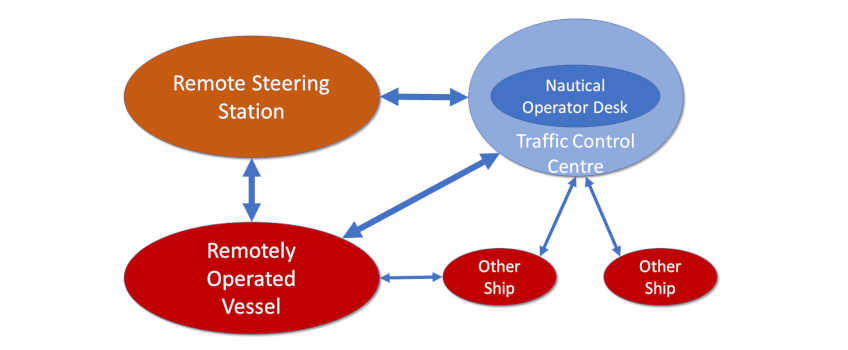To keep inland navigation competitive, new ways are being sought to increase its efficiency, to lower emissions and to reduce the need for personnel, because the young skilled inland navigation operators are rare in Germany.
In a joint project that was approved by the Federal Ministry for Economic Affairs and Energy (BMWi) in June 2020, in-innovative-navigation GmbH is working with a number of partners to investigate the possibilities of coordinated, remote-controlled navigation of inland vessels.
The operating and display options for controlling a barge are to be implemented in a remote-steering station on land. By equipping the ship with adequate sensors, all necessary information about the ship and its surroundings shall be also available in the remote steering station. In addition, the rudders, propulsion, and the other navigation devices as well as signalling and communication equipment must be capable of remote control. Safe data transmission to the remote-steering station on land is an important point. The skipper navigating from there is relieved by assistance functions in his tasks. For example, automatic track guidance, for example, significantly reduces the frequency of steering interventions. A collision warning system shows him dangerous situations in good time.
As an additional element, a control centre will be implemented, where the entire traffic on the waterway and its surroundings can be monitored. The mutual exchange of information between remote-steering station, e.g. with the current course input given for the ship, the control centre with the global traffic situation and its predictions, enables a comprehensive digital networking of traffic participants on the waterway beyond remotely navigating a vessel.
in-innovative navigation GmbH (IN) as a specialist for navigation and traffic monitoring is highly skilled in detection and display of on-board sensor information, especially radar. In addition, the implementation of the control centre with the remote steering unit is a main focus of IN’s work in this project.
To evaluate the new functions, a real inland vessel shall be equipped accordingly. The test field for autonomous inland vessels will be on the Dortmund-Ems Canal. In advance, a digital twin of the ship shall be implemented to simulate the journey of the ship under remote-control. The new Test and Management Centre for autonomous inland shipping (VeLaBi) at DST is available for the implementation of the remote steering station and the control centre units.
In addition to in-innovative navigation GmbH, the following partners are involved in the project: the Development Centre for Ship Technology and Transport Systems eV (DST), Argonics GmbH, the engineering office Kauppert, the Federal Institute for Hydraulic Engineering (BAW), the University of Duisburg-Essen with 3 institutes (ISMT-Institute for Ship Technology, Ocean Engineering and Transport Systems, SRS-Chair for Control, Regulation and System Dynamics, IMECH-Chair for Mechatronics and System Dynamics), as well as the RWTH Aachen with the Institute for Control Engineering (IRT).


 Bespoke Programming
Bespoke Programming